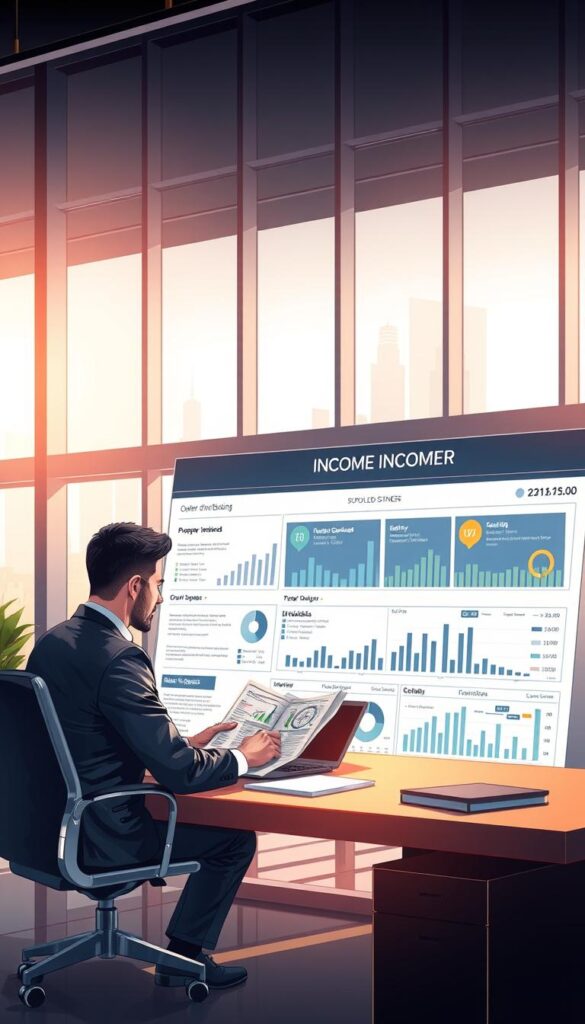Ever thought about whether to take a salary or dividends as a business owner? Knowing how to compensate yourself can greatly affect your finances and taxes. It’s more than just how you get paid; it’s about understanding the financial and legal sides.
In the U.S., small business owners usually make between $83,000 and $126,000. But many skip a salary in the early days, which can be risky. It’s key to plan your compensation wisely, knowing about taxes and labor laws.
When deciding how to get paid, think about a mix of salary and dividends. This can help with taxes and keep your income steady. Talking to a financial advisor or CPA can help your business and personal finances thrive.
Key Takeaways
- Business owners often earn between $83,000 and $126,000, varying by factors.
- A significant percentage of owners do not take a salary in early operations.
- Approximately 30% of income is advised for tax savings.
- Regularly evaluate compensation strategies with a financial professional.
- Understand the tax implications of both salary and dividends to optimize finances.
- A mixed approach of salary and dividends may offer significant benefits.
Understanding Business Owner Compensation
As a business owner, figuring out how to pay yourself is key for your financial health. You can choose between a business owner salary and business owner dividends. Each option has its own pros and cons.
A salary is like regular income and is taxed only once. It lets you save for retirement and get tax credits. The IRS looks at what’s fair for salaries, so keep records like meeting minutes handy.
On the other hand, dividends are profits shared from your business. They’re not deductible, leading to double taxation. But, dividends have different tax rules than salaries.
It’s smart to mix both salary and dividends. Many businesses do this to save on taxes and follow IRS rules. Knowing how each works helps you make better financial choices.
The Basics of Salary Payment
Salaries are key for business owners. They provide a steady income and help with financial planning. Knowing about salary payments is important for managing taxes and following the law.
Defining Salary for Business Owners
A business owner’s salary is a regular payment seen as personal income. It must be fair, based on the work done in the business. Corporate officers are usually seen as employees and get a Form W-2 for their wages.
Getting employee status wrong can lead to big tax problems. This includes social security, Medicare taxes, and penalties for not following the rules.
How Salaries Affect Corporate Tax Returns
Your salary is important for your corporation’s taxes. Salaries are seen as business costs, which can lower the corporation’s taxes. This can save you money.
But, you’ll also have to pay personal income tax on your salary. This tax might be higher than the corporate tax rate. It’s key to find the right balance between salary and other pay to save on taxes and follow the law.

The Basics of Dividend Payments
Knowing the basics of dividends is key for business owners. Dividends are a way for companies to share their profits with shareholders. They are different from salaries because they are based on after-tax profits.
This is important when thinking about how to pay yourself. It affects your financial planning.
Defining Dividends and Their Impact on Income
Dividends are seen as investment income, not a business expense. This means they don’t lower a company’s taxes. For personal money, dividends are different from salaries.
They don’t help with RRSP contributions. Your RRSP room is based on your earned income.
How Dividends Are Disbursed to Shareholders
Getting dividends involves a few steps. Companies give out T5 slips to report dividend income. This is different from salaries, which are paid out more often.
Dividends offer flexibility. Business owners can choose when to give out money. This can help with managing cash flow.
| Feature | Salaries | Dividends |
|---|---|---|
| Income Type | Active Income | Passive Income |
| Tax Deduction | Tax-Deductible | Not Tax-Deductible |
| Contributes to RRSP | Yes | No |
| Filing Frequency | Monthly/Quarterly | Annually (T5) |
| Maximum Savings (CPP/QPP) | None | Up to $10,000 |
In conclusion, knowing the difference between dividends and salaries is important. It helps with financial planning. This knowledge helps you make better decisions for your business and personal finances.
Paying Yourself as a Business Owner: Salary vs. Dividends
Choosing how to pay yourself as a business owner is a big decision. It affects your income and personal finances. Knowing the difference between salary and dividends helps you make a choice that fits your financial goals.
Importance of Choosing the Right Payment Structure
Choosing the right payment method is key to getting the most benefits and saving on taxes. If you’re in a high tax bracket, paying a salary might be better. It’s a business expense that lowers your taxable income. On the other hand, dividends let you share profits after taxes, giving you more flexibility with your money.
The best choice depends on your business’s financial situation and your long-term plans.
Factors Influencing Your Decision
Several things can influence your choice between salary and dividends:
- Tax Implications: Your company’s income and your personal tax rate can affect which option saves you more in taxes.
- Cash Flow Requirements: Think about your current financial needs and plans for investing in your business.
- Retirement Considerations: Salary payments can help you save more for retirement by increasing your RRSP contribution room.
- Eligibility for Benefits: Salary payments are needed to contribute to plans like the Canada Pension Plan (CPP), affecting your future benefits.
- Administrative Complexity: Paying dividends is simpler and reduces the hassle of handling salaries.

Tax Implications of Salary and Dividends
Knowing how taxes affect your business income is key to smart money planning. Salaries and dividends have their own tax rules and benefits. Think about corporate tax rates and how they shape your tax plan.
Overview of Personal Income Tax vs. Corporate Tax Rates
Salaries and dividends are taxed differently. Salaries lower your company’s tax bill because they’re deductible. But, they’re also taxed as personal income and FICA taxes, cutting into your take-home pay.
Dividends, though, are taxed less at the corporate level. C corporations face double taxation, paying taxes at both the corporate and shareholder levels. The corporate tax rate is 21%. But, dividends are taxed at a top rate of 20% for individuals, making them sometimes more tax-friendly.
How to Calculate Tax Obligations
To figure out your taxes, follow these steps:
- First, add up your salary and dividend amounts.
- Then, calculate corporate taxes based on your earnings.
- Next, figure out personal income taxes on your salary and dividends.
- Lastly, look for deductions like the 20% deduction for S corporations.
| Type of Compensation | Tax Implications |
|---|---|
| Salaries |
|
| Dividends |
|
By understanding these tax aspects, you can craft a tax plan that reduces your costs and boosts your earnings.

Benefits of Taking a Salary
Choosing to receive a salary as a business owner has many benefits. It boosts your cash flow and helps with retirement planning and taxes. This approach is good for your financial future.
Retirement Savings Through Salary Payments
By taking a salary, you contribute to the Canada Pension Plan (CPP). This can secure your financial future in retirement. You also get to build your Registered Retirement Savings Plan (RRSP) contribution room. This maximizes your retirement savings.
This strategy supports your overall financial well-being as a business owner.
Eligibility for Income Tax Credits
Receiving a salary also makes you eligible for income tax credits. You can get credits for childcare and medical expenses. This financial relief is a big plus.
Structured wage payments are key to accessing these credits. So, taking a salary is good for your finances now and in the future.

Benefits of Taking Dividends
Choosing to take dividends instead of a salary has many benefits for business owners. Knowing these advantages helps you make smart choices about your income.
Potential Lower Tax Rates on Dividends
Dividends often mean lower taxes for business owners. For example, dividend income is taxed at 8.75% for basic rate taxpayers and 33.75% for higher rate taxpayers. This is lower than the 20% and 40% tax rates for salary earnings. This can greatly increase your after-tax income, making dividends a good choice for many.
Flexibility in Payment Timing
Dividends also offer flexibility in when you can receive them. You can decide when to pay out profits. This is great for managing your cash flow and planning your taxes. By timing your dividend payments right, you can meet your financial needs or plan for taxes.

| Type of Income | Tax Rate | Personal Allowance | Dividends Tax-Free Allowance |
|---|---|---|---|
| Salary | 20% – 45% | £12,570 | N/A |
| Dividends | 8.75% – 39.35% | N/A | £500 |
Understanding dividends can greatly improve your financial strategy. With lower taxes and more flexibility, dividends offer a way to better align your income with your goals.
Owner Pay Structure: Salary vs. Dividends
Choosing how you get paid as a business owner is a big decision. You have to weigh the pros and cons of salary and dividends. Look at your business’s money situation and growth plans to make the best choice.
Possible Combinations of Salary and Dividends
Maybe mixing salary and dividends is the way to go. Salary is a business expense, which lowers your taxes. Taking less salary means more money to invest in your business.
On the other hand, dividends can save you money on taxes compared to salary. This makes them a good choice for getting income.
Evaluating Your Business’s Financial Health
Understanding your business’s money situation is key. Look at your profits and expenses to figure out the best mix of salary and dividends. Getting a steady income from salary can help when you need a mortgage.
But, dividends don’t help with CPP contributions, which is important for retirement. Think about your cash flow and tax implications to make a smart financial plan.

Considerations for Small Business Owners
As a small business owner, knowing how your pay affects your finances and business is key. Getting paid regularly helps keep your income stable. This is important when you need a mortgage. Lenders like steady income, making it easier to get a mortgage.
Think about what you need financially when setting your pay. This helps you feel secure and stable.
Monthly Income Stability and Mortgage Applications
Having a steady income makes your finances predictable. This is good when you’re applying for a mortgage. Lenders trust people with steady paychecks more.
Keeping your income stable shows you’re good with money. This can make lenders see you as more reliable.
Understanding Your Financial Needs
Your financial goals shape your pay choice. You should consider your monthly costs, savings, and future financial health. A steady income helps with bills and saving for the future.
Choosing between salary and dividends affects your personal and business finances. It helps you meet your goals and secure your business’s future.

Strategies for Business Owner Tax Planning
Learning about business owner tax strategies can save a lot of money. It’s key to plan taxes well to lower your tax bill and follow IRS rules. There are many ways to make your pay structure work better for you.
Maximizing Deductions Through Salary Payments
Getting paid a fair salary can bring big tax benefits. Business owners should save about 40% of profits for taxes to avoid cash problems later. A salary cuts down the corporation’s taxable income, which lowers taxes.
Also, putting money into retirement accounts like a Solo 401(k) or SEP IRA can help with taxes. You can contribute as an employee and employer, which can cut your taxable income. Using accountable plans lets you pay back business expenses without taxes.
Tax Strategies for Dividend Payments
For S corporations or C corporations, dividends are a smart tax move. Distributions from an S corporation are taxed less and don’t have self-employment tax. This can save a lot compared to salaries, which have payroll taxes.
Timing dividend payments can also help with taxes. Dividends don’t need withholding, so you can manage your money better. Keeping track of business expenses is important for deductions and better taxes. Using these strategies can improve your finances and keep your business in line.

Evaluating Your Personal Financial Goals
As a business owner, it’s key to check your personal financial goals against your pay plans. Knowing how your pay affects your future and current lifestyle is important. It helps you make choices that match what you want from your business.
Think about your financial goals well. They will shape your pay plan and help secure your financial future.
Setting Long-Term Financial Objectives
Setting clear financial goals is essential for your pay plan. Think about retirement, buying a home, and education costs. Your choice between salary and dividends impacts these goals.
Salaries help with CPP and RRSPs. But dividends might not offer the same long-term benefits. Make sure your goals match your pay plan.
Assessing Your Current Lifestyle Needs
Think about your current needs when choosing pay. Salaries offer steady cash flow for bills and living costs. Dividends give you flexibility to take money when you need it.
See how these options fit your lifestyle and long-term goals.
| Compensation Type | Costs for $100,000 (Ontario) | Costs for $200,000 (Ontario) | Total Personal Tax Costs | CPP Costs |
|---|---|---|---|---|
| Salary | $104,430.10 | $204,430.10 | $21,031.00 | $8,860.20 |
| Dividends | $14,115.00 | $53,654.00 | $14,115.00 | N/A |
Consulting with Tax Professionals
As a business owner, managing your pay structure is complex. It involves understanding tax regulations and strategies. Tax professionals can offer valuable insights. They help tailor compensation strategies to maximize your income while following the rules.
When to Seek Professional Guidance
Knowing when to get help from tax professionals is key. It’s a good idea to seek their advice when:
- You plan to change your owner pay structure.
- You’re unsure about how salary and dividends impact your taxes.
- You want to learn about tax-saving opportunities.
- Your business income changes a lot.
Benefits of Custom Tax Strategies
Working with tax professionals has many benefits. They help create custom tax strategies. Their knowledge allows you to:
- Take advantage of deductions based on your salary.
- Understand the benefits of dividend payments without breaking the rules.
- Design an owner pay structure that improves cash flow and follows tax laws.
- Get advice on retirement savings linked to your compensation.

Conclusion
Choosing between salary and dividends is a big decision for business owners. It affects your money and taxes. We’ve shown how each choice has its own good points and things to think about.
Your choice should match your financial goals and your business’s setup. It also depends on how well your business is doing.
Look at your business’s money situation to decide on a salary rate. Make sure you have enough money for bills, taxes, and growth. Salary gives you steady money, while dividends let you control your income better.
Every business owner is different. So, think carefully before making a choice. This way, you make a decision that fits your business and goals.
Managing your pay well helps with financial stability. It also helps with planning for the future, like retirement. By considering salary and dividends and getting advice from tax experts, you can create a pay plan that meets your goals and business needs.
FAQ
What is the difference between a salary and dividends for business owners?
How do I determine if I should pay myself a salary or dividends?
What tax implications should I be aware of when choosing between salary and dividends?
Can I combine salary and dividends as a compensation strategy?
What are the benefits of taking a salary as a business owner?
What are the advantages of choosing dividends over a salary?
How do dividends affect my personal income tax?
Why is it important for small business owners to understand compensation strategies?
Should I consult a tax professional for compensation strategies?
How does my compensation choice impact my business tax obligations?
Source Links
- How to Calculate a Business Owner’s Salary – https://www.uschamber.com/co/run/finance/how-to-calculate-business-owners-salary
- Dividends vs salary: What’s better for company directors? – Starling Bank – https://www.starlingbank.com/resources/business-guides/taking-dividends-vs-salary/
- 4 Ways Corporate Business Owners Can Help Ensure Their Compensation Is “Reasonable” – https://www.accountingfreedom.com/c-corp-salary-vs-dividends/
- S Corp Reasonable Salary: A Guide To Paying Yourself | Collective – https://www.collective.com/blog/money-management/freelancers-guide-to-paying-yourself-a-salary-from-an-s-corporation
- Salary or dividends: How should business owners pay themselves? – MoneyTalk – https://www.moneytalkgo.com/video/salary-or-dividends-how-should-business-owners-pay-themselves/
- Paying yourself | Internal Revenue Service – https://www.irs.gov/businesses/small-businesses-self-employed/paying-yourself
- Owner’s Draw vs. Salary: How to Pay Yourself | Bench Accounting – https://www.bench.co/blog/accounting/owners-draw
- What are Distributions? | Small Business Owner Salary | Pursuit – https://pursuitlending.com/resources/what-are-distributions-how-to-pay-yourself-as-a-business-owner/
- Should You Pay Yourself a Salary or Dividend? 7 Considerations For Small Business Owners – https://www.montrealfinancial.ca/blog/should-you-pay-yourself-a-salary-or-dividend-7-consideration.html?srsltid=AfmBOooS1yBsuOVefHuZps4pD4P4eEmS9J0KTrEsZGKFoxDboxOfFNCI
- Getting Paid: How to Pay Yourself from Your LLC – https://www.legalzoom.com/articles/getting-paid-how-to-pay-yourself-from-your-llc
- Is it better to pay yourself a salary or dividends? – https://www.nbc.ca/business/advice/money-and-finances/salary-dividend.html
- Salary vs Dividends: The Ultimate Guide on How to Pay Yourself From a Corporation in Canada | NowCPA – https://nowcpa.ca/salary-vs-dividends/
- Shareholder Salary vs. Dividends: Tax Implications & Tips – https://accountants.sva.com/biz-tips/shareholder-salary-vs.-dividends-or-distributions
- Compensating the Business Owner: Part II – https://www.wolterskluwer.com/en/expert-insights/compensating-the-business-owner-part-ii
- T2inc.ca – Tax Accountants Levis – https://t2inc.ca/en/blog/salary-or-dividends-pay-less-tax
- Should I Pay Myself in Salary or Dividends? – IP Private Wealth – https://ipprivatewealth.com/should-i-pay-myself-in-salary-or-dividends/
- How to Pay Yourself as a Small Business Owner – https://www.legalzoom.com/articles/how-to-pay-yourself-from-your-small-business
- Two ways to pay yourself from a corporation: salary vs. dividend – https://www.growcpa.ca/blog/two-ways-to-pay-yourself-from-an-incorporated-business-salary-vs-dividend
- Dividends vs Salary: What’s The Most Tax Efficient for Directors? | unbiased.co.uk | Unbiased – https://www.unbiased.co.uk/discover/tax-business/running-a-business/salary-vs-dividends-taking-income-from-your-company
- Dividend vs. Salary: Which is Better for Your Business? | Ownr Blog – https://www.ownr.co/blog/dividend-vs-salary/
- Paying yourself as a business owner: Salary vs. Dividends – Vertical CPA – https://verticalcpa.ca/paying-yourself-as-a-business-ownersalary-vs-dividends/
- Salary vs. Dividends: Which should you choose and why? | Knit People Small Business Blog – https://www.knitpeople.com/blog/salary-vs-dividends
- Salary vs dividend – which is now best for business owners? – https://www.shipleys.com/resources/salary-vs-dividend-which-is-now-best-for-business-owners/
- Dividends vs. salary: What’s the best way to pay yourself? – https://go.truenorthaccounting.com/blog/paying-yourself-dividends-vs-salary
- How Business Owners Can Pay Themselves: Simple Payment Guide – https://www.joinhomebase.com/blog/how-to-pay-yourself-as-owner
- Paying yourself: Owners draw vs salary | OnPay – https://onpay.com/insights/pay-yourself-owners-draw-vs-salary/
- The Business Owner Guide To Paying Yourself | Nav – https://www.nav.com/blog/pay-yourself-as-a-business-owner-4041794/
- Tax Efficient Pay Structure: A Guide for Business Owners – https://www.jec-llc.com/blog/tax-efficient-pay-structure-a-guide-for-business-owners
- Salary vs. dividend: The best way to pay yourself | Baker Tilly Canada | Chartered Professional Accountants – https://www.bakertilly.ca/en/sundre-alberta/blog/salary-vs-dividend-the-best-way-to-pay-yourself
- Salary vs Dividends: How to Pay Myself from My Business – https://wtcca.com/blog/salary-vs-dividends/
- Paying Yourself as a Business Owner: Salaries or Dividends? – AH CPAs – https://www.achenhenderson.ca/corporate-tax-accountants/salaries-vs-dividends/
- Salary vs. Dividends – How To Pay Yourself? – https://cpa4it.ca/salary-vs-dividends-whats-the-best-way-to-pay-yourself/
- How to Pay Yourself as a Business Owner – https://www.trinet.com/insights/how-to-pay-yourself-as-a-business-owner
- Owner’s Draw vs. Salary: Paying Yourself as a Business Owner – https://www.freshbooks.com/hub/leadership/owners-draw-vs-salary-how-to-pay-yourself-as-a-business-owner?srsltid=AfmBOooJPcw311tXTLqK10tluOYUg1QMC76MBH9ZpcGj8XpbZu44Ckwf
- How To Pay Yourself a Salary vs. Distributions From Your LLC – https://fincent.com/how-to/pay-yourself-a-salary-vs-distributions-from-your-llc
- Salary vs Dividends: The Most Tax-Efficient Way to Pay Yourself As a Business Owner – https://www.trusted-advisor.co.uk/articles/salary-vs-dividends-the-most-tax-efficient-way-to-pay-yourself-as-a-business-owner